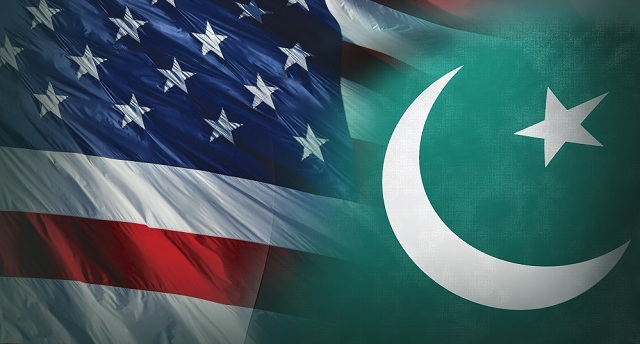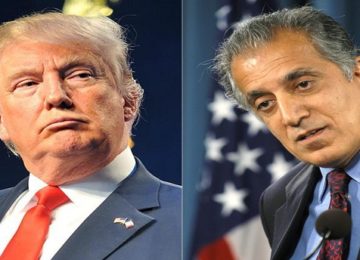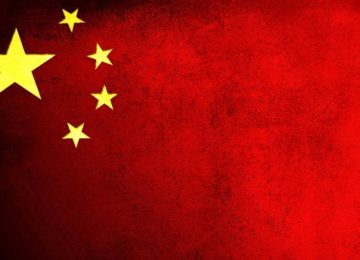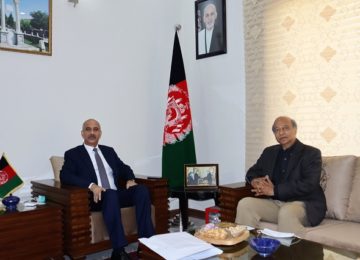The United States has taken the “new year, new me” approach rather literally. In a few hours past New Year’s eve, President Trump shattered the much optimistic stride many in Pakistan looked forward to. From its generals stationed in Afghanistan, to the US ambassador appointed to the U.N, accusations and threats have been hurled against Pakistan. Notice after notice of “do more” were issued with press briefs from the White House and later from the State Department of more details on “specific actions” to be taken against Pakistan would emerge in days to come.
It’s not only Pakistan that we pay billions of dollars to for nothing, but also many other countries, and others. As an example, we pay the Palestinians HUNDRED OF MILLIONS OF DOLLARS a year and get no appreciation or respect. They don’t even want to negotiate a long overdue…
— Donald J. Trump (@realDonaldTrump) January 2, 2018
Pakistan on the other hand, seems less intimidated by the chest thumping and warmongering going on in Washington. But as Islamabad sat down to discuss the next course of action in a meeting of the Federal Cabinet after a sitting in the National Security Committee; the White House had already fuelled its jets and held all security-related aid in abeyance. Before President Trump turned his hot guns towards Pakistan, they were up against North Korea. Although Pakistan and North Korea are not the same cases, one thing is strikingly similar and that is the US aggression. Though this may seem a farfetched and possibly the worst case scenario, be it for Pakistan or North Korea, but the signals coming from the US are that of an “action”. The recent statement of US’ National Security Advisor, Lt. Gen McMaster gives an idea of the mindset prevalent in the Trump administration. But why is the US resorting to coercion and warmongering, even though it is facing multifarious challenges that require deft diplomacy?
War is a profitable business they say. United States is one of the biggest exporters of weapons in the world. With its long yet ongoing war in Afghanistan and ventures into other conflicts, the US is also constantly producing arms. The weapons industry in the US is also one of the most influential lobbying groups and plays an important but usually overlooked role in making American security and defense policy. Many might disagree with the statement, but it is a fact that no longer can be ignored. The Trump administration has the highest number of retired and severing military officers appointed on key positions. While diplomacy is taught even to the officers, it is not in their first instincts. As US aided Pakistan throughout the years, not for anything but out of its own will and diplomacy, a staggering cut in the sum was already made, a point Pakistan cleared as an initial response to President Trump’s tweet. Watchers are certain that the US cannot browbeat Pakistan by mere aid-cuts and hence it may exploit other options but that would only strengthen Pakistan’s bond with Russia and China.
Pakistan is not unaware of America’s use of drone in the region and inside Pakistan – with or without the said support of Pakistan’s intelligence. But the last time America showed aggression inside Pakistani territory, it resulted in a halt of the supply route to US and NATO forces in Afghanistan; a card Pakistan could readily play again. But while Pakistan continues to carry out operations inside Pakistan to weed out extremists, trail of the recent attacks in Pakistan led back to Afghanistan. The US also sees the giant CPEC as an expansion of China into the region and made no pleasant remarks about it. Pakistan has very much moved away from its dependency on the United States and enjoys a comfortable relation with Russia and China. The trio together has held a solid opinion on matters related to Afghanistan. Pakistan strongly opposed the United States in the United Nations over its decisions to move its embassy to Jerusalem and each country that voted in negative was warned, hence threats to Pakistan come as no surprise but the extent to which the US might go, are grim but unclear. US could follow the aid cut with sanctions against Pakistan or attempt drone attacks inside Pakistan.
Afghanistan holds the needed ground and military setup for the US to breach into Pakistan which would result in an untenable conflict between the two. The US has been apprehensive about the nuclear assets of Pakistan. India included, the US wishes to de-nuclearize Pakistan in the long term. The current pattern by the US, if continues, could curb Pakistan in the eyes of US but the reaction could also be a full blown diplomatic shutdown. The chatter in Islamabad is that the military will now direct Pakistan’s policy towards US. Despite the internal political turmoil in Pakistan, US aggression seems to be a unifying factor not only for the civil and military leadership but could also attract unlikely friends for Pakistan which could result in a better outcome for Pakistan as a whole.
The notion that the US is taking out the frustration of its defeat in Afghanistan on Pakistan carries less weight. Ever since China and Russia mediated numerous peace efforts in Afghanistan, the US needs to maintain a presence in Afghanistan to counter the rising regional alliance out of which Pakistan seems an easy target. With safe havens of newer terrorist groups like ISIS in Afghanistan, the US accusations against Pakistan are like crying wolf. To establish its expansion in the region, the US needs Pakistan either split up or enslaved. Pakistan’s strong and unified reaction towards US so far, shows that Pakistan would be willing to face the grim actions like sanctions by US but not at the cost of its sovereignty.
But America is looking for another war; be it with Pakistan or North Korea or perhaps even Iran, since it needs to keep threats alive in order to defend itself from them. Picking a fight with Pakistan however, could mean a full stop in the cooperation between Pakistan and the United States for good and would be a major setback for US and NATO forces in Afghanistan. By cutting aid and putting Pakistan on several watch lists including that of violating religious freedom, the US is certainly narrowing down its options for a diplomatic comeback with Pakistan. However, only the coming days will set a clearer picture for the future of Pakistan-US ties, which for now seem to be taking a turn for the worst.
The author Aisha Saeed is an independent media and foreign policy analyst based in Lahore. She tweets @MsAishaK.
© Center for Research and Security Studies (CRSS) and Afghan Studies Center (ASC), Islamabad.








